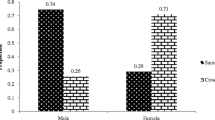Abstract
It was hypothesized that male day care teachers who had adopted the “feminine” role of caregiver would score feminine in their personality traits and would reinforce children for feminine behaviors and punish them for masculine behaviors. A random sample of 20 male caregivers was contrasted to 20 male engineers on personality traits as assessed by The Adjective Checklist (ACL). Twenty female caregivers were also contrasted to the personality traits and the sex-typed contingency behaviors of the male caregivers. Feminine traits were defined by raw scores on the Abasement, Nurturance, Affiliation, Succorance, and Deference scales of the ACL. Masculine traits were represented by raw scores on the Achievement, Dominance, Endurance, and Autonomy scales. The Fagot-Patterson Checklist was employed to determine sex-typed contingency behaviors. Both male and female caregivers reinforced children significantly more for feminine behaviors than masculine behaviors (as defined by The Fagot-Patterson Checklist) and punished masculine behaviors more than feminine behaviors. The personalities of the male caregivers corresponded to the feminine direction of their female counterparts, but they were not significantly more feminine than the male engineers. The female caregivers, however, scored significantly more feminine in personality than the male engineers.
Similar content being viewed by others
References
Brophy, J. E. & Good, T. L. Teacher-student relationships: Causes and consequences. New York: Holt, Rinehart & Winston, 1974.
Brophy, J. E., & Laosa, L. M. Effect of a male teacher on the sex typing of kindergarten children. Proceedings of the 7th Annual Meeting of the American Psychological Association, 1971, 6, 160–170.
Burtt, M. The effect of a man teacher. Young Children, 1965, 21, 93–97.
Drive to open up more careers for women. U. S. News and World Report, January 14, 1974, 76, 69–70.
Edwards, A. L. Manual-Edwards personal preference schedule. New York: The Psychological Corporation, 1954.
Etaugh, C., Collins, G., & Gerson, A. Reinforcement of sex-typed behaviors of two-year-old children in in a nursery school setting. Developmental Psychology, 1975, 11, 255.
Etaugh, C., & Hughes, V. Teachers' evaluations of sex-typed behaviors in children: The role of teacher sex and school setting. Developmental Psychology, 1975, 11, 394.
Fagot, B. I., & Patterson, G. R. An in vivo analysis of reinforcing contingencies for sex-role behaviors in the preschool child. Developmental Psychology, 1969, 1, 563–568.
Feshbach, N. D. Student teacher preferences for elementary school pupils varying in personality characteristics. Journal of Educational Psychology, 1969, 60, 126–132.
Good, T., & Grouws, D. Reaction of male and female teacher trainees to descriptions of elementary school pupils. (Techinical Reports No. 62) Columbia, Missouri: Center for Research in Social Behavior, University of Missouri, 1972.
Gough, H. G., & Heilbrun, A. B. Joint manual for the adjective check list and the need scales for ACL. Palo Alto: Consulting Psychologists Press, 1965.
Heilbrun, A. B. Perceived maternal attitudes, masculinity-femininity of the maternal model, and identification as related to incipient psychology in adolescent girls. Journal of Genetic Psychology, 1964, 70, 33–40.
Johnston, J. M. A symposium: Men in young children's lives. Part II. Childhood Education, 1970, 47, 144–147.
Kendall, E. We have men on the staff. Young Children, 1972, 27, 358–362.
Kerlinger, F. N. Foundations of behavior research (2nd ed.). New York: Holt, Rinehart, & Winston, 1973.
Kyselka, W. Young men in a nursery school. Childhood Education, 1966, 42, 293–299.
Lee, P. C. Male and female teachers in elementary schools: An ecological analysis. Teachers College Record, 1973, 75, 79–98.
Levitin, T. E., & Chananie, J. E. Responses of female primary school teachers to sex-typed behaviors in male and female children. Child Development, 1972, 43, 1309–1316.
Lynn, D. B. A note on sex differences in the development of masculine and feminine identification. Psychological Review, 1959, 66, 126–135.
Lynn, D. B. The process of learning parental and sex-role identification. Journal of Marriage and the Family, 1966, 28, 466–470.
Madsen, C. Nurturance and modeling in preschoolers. Child Development, 1968, 39, 222–236.
Mason, W. S., Dressel, R. J., & Bain, R. K. Sex role and the career orientations of beginning teachers. Harvard Educational Review, 1959, 29, 370–383.
McCandless, B. R., & Bush, C. Reinforcing contingencies for sex role behaviors in preschool children. Unpublished manuscript, Emory University, 1975.
Parsons, T. Family structure and the socialization of the child. In T. Parsons & R. F. Bales (Eds.), Family, socialization, and interaction process. Glencoe, Ill.: Free Press, 1955.
Peltier, G. I. Sex differences in the school: Problem and proposed solution. Phi Delta Kappan, 1968, 50, 182–185.
Schein, V. E. Relationships between sex role stereotypes and requisite management characteristics among female managers. Journal of Applied Psychology, 1975, 60, 340–344.
Sciarra, D. J. A study of the effects of male role models on children's behavior in a day care center. Unpublished doctoral dissertation, University of Cincinnati, 1970.
Sciarra, D. J. What to do till the male man comes. Childhood Education, 1972, 49, 190–191.
Sexton, P. C. The feminized male. New York: Random House, 1969.
Strong, E. K. Vocational interest of men and women. Stanford: Stanford University Press, 1943.
Terman, L. M., & Miles, C. C. Sex and personality: Studies in masculinity and femininity. New York: McGraw-Hill, 1936.
Triplett, L. Elementary education: A man's world? The Instructor, 1968, 78, 50–52.
Vairo, P. D. Wanted: 20,000 male first-grade school teachers. Education, 1969, 89, 222–224.
Williams, B. M. A symposium: Men in young children's lives. Part I. Childhood Education, 1970, 47, 139–143.
Yee, A. H. Are the schools a “feminized society”? Educational Leadership, 1973, 31, 128–133.
Author information
Authors and Affiliations
Additional information
This study is based on a dissertation submitted by Bryan E. Robinson to the Department of Child Development — Family Relations, University of North Carolina at Greensboro, in partial fulfillment of the requirements for the Ph.D.
Rights and permissions
About this article
Cite this article
Robinson, B.E., Canaday, H. Sex-role behaviors and personality traits of male day care teachers. Sex Roles 4, 853–865 (1978). https://doi.org/10.1007/BF00287705
Issue Date:
DOI: https://doi.org/10.1007/BF00287705



